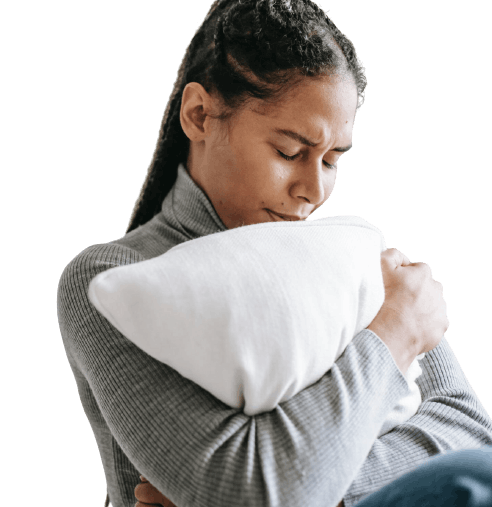Table of contents
1. Dyspareunia
2. Why does sex hurt?
3. The physical causes
4. The psychological causes
5. How to cope with pain during sex
6. Let’s keep the conversation going
Sophie*, 27, experiences pain during sex almost every time she has it. She’s with a long-term partner, but painful intercourse is an issue that, for her, has been ongoing for years. “It’s particularly bad when [I’m] tense, or not relaxed,” she tells me.
For Sophie, the pain has nothing to do with a lack of desire. “I have the urge [to have sex], but the pain happens regardless,�” she says. “It just feels very painful at first — [though] it sometimes gets better throughout the sex, and the more regularly I do it the easier it is. Lube helps, as does asking my other half to slow down; but sometimes we just have to stop.”
Dyspareunia
Sophie’s experience is all too common (a 2017 study published in BJOG: An International Journal of Obstetrics and Gynaecology found that nearly one in ten women experience painful sex. In fact, the issue is so widespread that it has a medical noun: dyspareunia); and it’s one I’ve experienced first hand. Two years ago, I started dating someone for whom I’d had feelings for months (and vice versa). By the time we eventually decided to have sex, we were in a committed relationship and the sex should have been incredible. Instead, it was agonising.

I’d never had pain during sex before; but this time, it felt like someone was running a flickering match over the nerve endings in my vagina. I told him it hurt, and he stopped straight away. I tried to relax my vaginal muscles; I wanted to have sex, after all. This was something I’d been thinking about for weeks — months, really. But my vagina wasn’t having any of it.
“
Nearly one in ten women experience painful sex
Charlotte Simpson, an Accredited Psychosexual and Relationship Therapist in Private Practice in North West London, outlines how dyspareunia can commonly manifest. “There can be different types of pain experienced during penetrative intercourse: which may occur all the time, or just sometimes,” she explains. “Some people experience pain or discomfort even when the vulva is touched, or at the entrance to the vagina; or deeper inside the vagina up to the cervix. These unwelcome sensations can vary and might be experienced as sharp pain, or a burning or aching feeling.”
Why does sex hurt?
27-year old Claire* describes the pain she used to experience during sex as “friction-y”.
“When I first started having sex, I’d experience [pain] a lot,” she tells me. “And I think I started to associate it as being normal. I think that was probably part of the reason why I didn’t really have a lot of sex at university: I just associated it with pain.”
Unlike Claire, I’d never associated sex with pain until my particular instance two years ago: but when I was trying to have sex with my boyfriend at the time, I felt confused and frustrated with my body. “Why does sex hurt?” is a question (regrettably) often asked by people with vaginas; but for me, it was more a case of: “Why does this sex hurt?” We tried to have sex a few more times over the following weeks, but nothing changed. I hadn’t had sex for a few years, but I still couldn’t understand the problem. I was into it, and we were using lube; but it was all punctuated by sharp stabs of pain.
In the end, I went to see a doctor. She assured me that everything looked normal and suggested tension as a possible cause of the pain. A couple of days after I saw her, my boyfriend and I tried again; and this time, we actually managed to have sex. I was relieved that the problem seemed to have gone away; but I still didn’t understand why my vagina had protested so much initially.
The physical causes
Vaginismus is a key example of a physical cause for painful intercourse. “Some people find that their vagina does not allow anything to penetrate it — and if they try, it really hurts: whether it be a tampon, a speculum for an internal examination, or a penis,” Simpson explains. “This could be due to vaginismus, which is when the muscles at the entrance of the vagina are very tight. Visit a medical doctor if this occurs regularly and is causing issues.”

When it comes to other physical causes of painful intercourse, Psychosexual Therapist and Nurse Practitioner Agnes Nereah Mosobela points out that these causes depend largely on where the pain is. “Is it at the point of penetration, inside the vagina or deep inside the pelvis?,” she points out; and goes on to offer several (non-exhaustive) possible physical causes of pain.
She suggests that vaginal dryness or inadequate lubrication might be to blame, and also proffers atrophy — “[a] narrowing of the vaginal canal and limitation in its ability to stretch” — and thrush as possible causes, together with recurrent cystitis: “due to the close proximity of the urethra to the vaginal canal, vaginal penetration will inevitably contribute to discomfort or pain in the urethra.” Mosobela also posits vulvodynia as a physical cause for pain during sex: a chronic condition that causes pain and discomfort of the vulva.
The psychological causes
Simpson is adamant that the brain has a crucial role to play in painful intercourse. “I think of the brain as the most important sex organ: the control centre,” she explains. “Not feeling turned on enough often comes from being preoccupied or experiencing feelings of resentment towards your partner; but it can also come from not experiencing the right kind of touch.”
“
The brain has a crucial role to play in painful intercourse
Mosobela’s (non-exhaustive) suggestions for psychological causes include a fear and anticipation of pain — “this creates a situation where the body tenses in anticipation of pain” —; penile phobia, which she describes as “concern about the size of the vagina; that the vagina is too small for the penis and will therefore do some damage”; and a lack of arousal, “which inhibits necessary physiological changes: mainly adequate lubrication and expansion of the vaginal canal.”
How to cope with pain during sex
When it comes to coping strategies, Mosobela maintains that pain should be checked out by a professional if the issue is persistent and recurrent, and that “attending a sexual health clinic may help”; but she also suggests some coping strategies, such as changing sex positions. “The pain may occur in certain positions during sex, especially those that encourage deep penetration. In cases such as those, changing positions usually resolves the problem.”
“Communicate well with your partner,” adds Simpson. “Find a good lube: not one that’s used for medical examinations, they tend to dry out quickly! Learn what kind of touch you enjoy. Most importantly, don’t make penetrative intercourse the gold standard when it comes to sex. Good sex does not have to include penetrative intercourse.”
Let’s keep the conversation going
It’s crucial that we keep the conversation going, when it comes to painful sex. “One of the biggest regrets that I have, from when I first started having sex, when I was about 17, is that I wouldn’t say anything [about the pain],” says Claire. “I’d just keep going, and ignore it. Now, I’m really consciously trying to change that. Having a bit more of a voice, now that I’m in my late twenties, I’ve kind of realised that just feeling able to say those things — being able to talk about it, and to say, ‘No, actually, this isn’t working’ — [has made it] really normal to reach for the lube.”
Reaching for the lube is, indeed, totally normal; and the commonality of dyspareunia means we need to continue to normalise conversations around painful intercourse.






